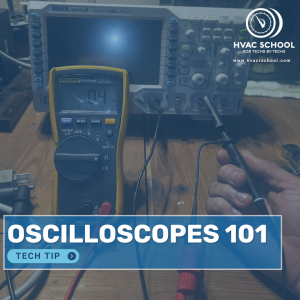BACK
 A2L Refrigerant Sensors: Understanding False Alarms from Off-Gassing
A2L Refrigerant Sensors: Understanding False Alarms from Off-Gassing
 Refrigeration Communication Troubleshooting Using Oscilloscopes
Refrigeration Communication Troubleshooting Using Oscilloscopes
 Preventing Heat Illnesses in the BLAZING Summer Heat
Preventing Heat Illnesses in the BLAZING Summer Heat
 What is RS-485 Communication?
What is RS-485 Communication?
 A2L Dissipation Boards and Leak Sensors
A2L Dissipation Boards and Leak Sensors
 Oscilloscope Systems and Settings
Oscilloscope Systems and Settings
 I’ve Done It This Way for 20 Years – And That’s the Problem
I’ve Done It This Way for 20 Years – And That’s the Problem
 Oscilloscopes 101
Oscilloscopes 101
 Estimating Made Easy with Unity Build
Estimating Made Easy with Unity Build
 Balance Point Explained w/ Jim Fultz
Balance Point Explained w/ Jim Fultz
 Dehumidify with a Waterfall? – Short #259
Dehumidify with a Waterfall? – Short #259
 What are User Requirements? w/ ELK
What are User Requirements? w/ ELK
 Static Pressure is like Blood Pressure – Short #258
Static Pressure is like Blood Pressure – Short #258
 How To Be a REAL Comfort Consultant
How To Be a REAL Comfort Consultant
 Non-bleed TXVs and Hard Starts – Short #257
Non-bleed TXVs and Hard Starts – Short #257
 Scroll Compressors & New Refrigerants w/ Copeland
Scroll Compressors & New Refrigerants w/ Copeland
 Leaky Ducts = Sweaty Houses – Short #256
Leaky Ducts = Sweaty Houses – Short #256
 Is Starting an HVAC Business Smart?
Is Starting an HVAC Business Smart?
#hvac
Tech Tips:

As the HVAC industry transitions to refrigerants with lower global warming potential (GWP), A2L refrigerants like R-454B are becoming more common. These refrigerants are classified as “mildly flammable” and require the installation of A2L refrigerant leak detection sensors in many applications to ensure safety. While these sensors are essential for detecting actual refrigerant leaks, HVAC […]
Read more

This tech tip is the final installment in our short series on using oscilloscopes to troubleshoot communicating systems. This time, we're focusing on troubleshooting communication issues in commercial refrigeration systems. Imagine this scenario: you've got a refrigeration system acting up, and the comms network, whether it's LON or MOD-bus, seems a bit flaky. Let me […]
Read more

This tech tip about preventing heat illnesses covers information and resources from the Cleveland Clinic, the U.S. Centers for Disease Control and Prevention (CDC), the U.S. Occupational Safety and Health Administration (OSHA), and the National Oceanic and Atmospheric Administration (NOAA). HVAC School is NOT an official OSHA training resource, and although these safety tips are […]
Read more

This tech tip about RS-485 communication is the third installment in a four-part series about oscilloscopes. It's a primer for the final installment about using an oscilloscope for diagnosis. I owe a special thanks to Jeremy Smith for sharing the information on Danfoss and for sparking my curiosity surrounding this type of communication. Let's talk […]
Read more

The HVAC industry's ongoing shift towards eco-friendly solutions continually introduces new challenges and learning opportunities. A2L refrigerants are at the forefront of this transformation, offering a lower global warming potential (GWP) than many of the refrigerants we’ve been using. A2L refrigerants are also mildly flammable, meaning they require some enhanced safety measures; one of these […]
Read more

This is part two of our four-part series on oscilloscope fundamentals. Special thanks to Andrew Holden for his contributions. In our last tech tip on oscilloscopes, we learned about some safety basics, waveforms, and measurements. We’re going to dive a little deeper into systems and settings on the oscilloscope in this tech tip. Systems are […]
Read more

Every trade has its favorite phrases. One of the most common in HVAC goes something like: “I’ve been doing it this way for 20 years and never had a problem.” When you hear that—or when you catch yourself saying it—it’s worth stopping to think. Usually, what that sentence really means is: “I’ve been doing it […]
Read more

This tech tip is the first in a four-part series on using oscilloscopes. I'd like to give a special thanks to Andrew Holden for his contributions to this particular tech tip. When we want to measure voltage between two points, we reach for a multimeter. A multimeter can tell us the average electrical potential between […]
Read more

Many of you may already know that our HVAC company, Kalos Services, is also a GC. We do a lot of construction projects with HVAC, plumbing, and electrical scopes of work. Estimating is a crucial part of winning those projects, and those of you who work on HVAC for new construction probably already have an […]
Read more
Videos:
Podcasts:

This comprehensive episode dives deep into one of the most critical yet misunderstood concepts in HVAC: balance point calculations for heat pump systems. Jim and Bryan break down the complexities of dual fuel systems, explaining why proper sizing and balance point calculations are essential for both comfort and efficiency. The discussion moves beyond basic […]
Read more

In this short podcast episode, Bryan talks about history and HVAC science: how to dehumidify the air with a waterfall and how cold water became the first air conditioner. In 1902, Willis Carrier worked for a printing company in Brooklyn, New York. There was a huge humidity problem during the summer: the printing plant […]
Read more

In this comprehensive session, Eric Kaiser walks through the critical importance of establishing proper user requirements before making equipment purchases. Drawing from real-world experiences in the HVAC industry, he demonstrates how poor upfront planning leads to costly mistakes, buyer's remorse, and multiple equipment purchases. The discussion covers everything from selecting simple tools like screwdrivers […]
Read more

In this short podcast episode, Bryan explains the science behind a common HVAC simile: static pressure is like blood pressure. He covers the similarities and differences between measuring static pressure during a service call or maintenance and a doctor measuring your blood pressure at a checkup. Total external static pressure (TESP) should be measured […]
Read more

In this comprehensive episode, Bryan Orr sits down with Tim De Stasio to explore the world of comfort consulting and performance contracting in HVAC. Tim, who sold his contracting company to focus on this specialized field, shares his methodical approach to diagnosing home performance issues that go far beyond traditional HVAC troubleshooting. Working primarily […]
Read more

In this short podcast episode, Bryan talks about non-bleed TXVs and whether they need hard starts. A non-bleed (hard shutoff) TXV is a metering device that shuts off during the off cycle; it closes shut when there is no superheat. This strategy prevents refrigerant migration, especially in cases where we have long line sets. […]
Read more

In this essential episode, Bryan sits down with Jeff and Tom from Copeland to dive deep into the world of scroll compressors and the critical topic of refrigerant compatibility. As the HVAC industry navigates new refrigerant standards and regulations, understanding how compressors are specifically designed and optimized for different refrigerants has never been more […]
Read more

In this short podcast episode, Bryan explains how leaky ducts can lead to sweaty, uncomfortable houses. Moisture issues are common all across humid and “green-grass” climates in the United States. Hot, unconditioned attics and crawl spaces also often have high dew points, which can cause moisture problems in those spaces. Plants also release moisture, […]
Read more

In this insightful episode of the HVAC School podcast, Bryan Orr sits down with successful small business owner Matt Bruner to discuss how to build and maintain a thriving HVAC business without the typical stress and overwhelming challenges that many entrepreneurs face. Matt, who has been running his own HVAC company for about two […]
Read more



























